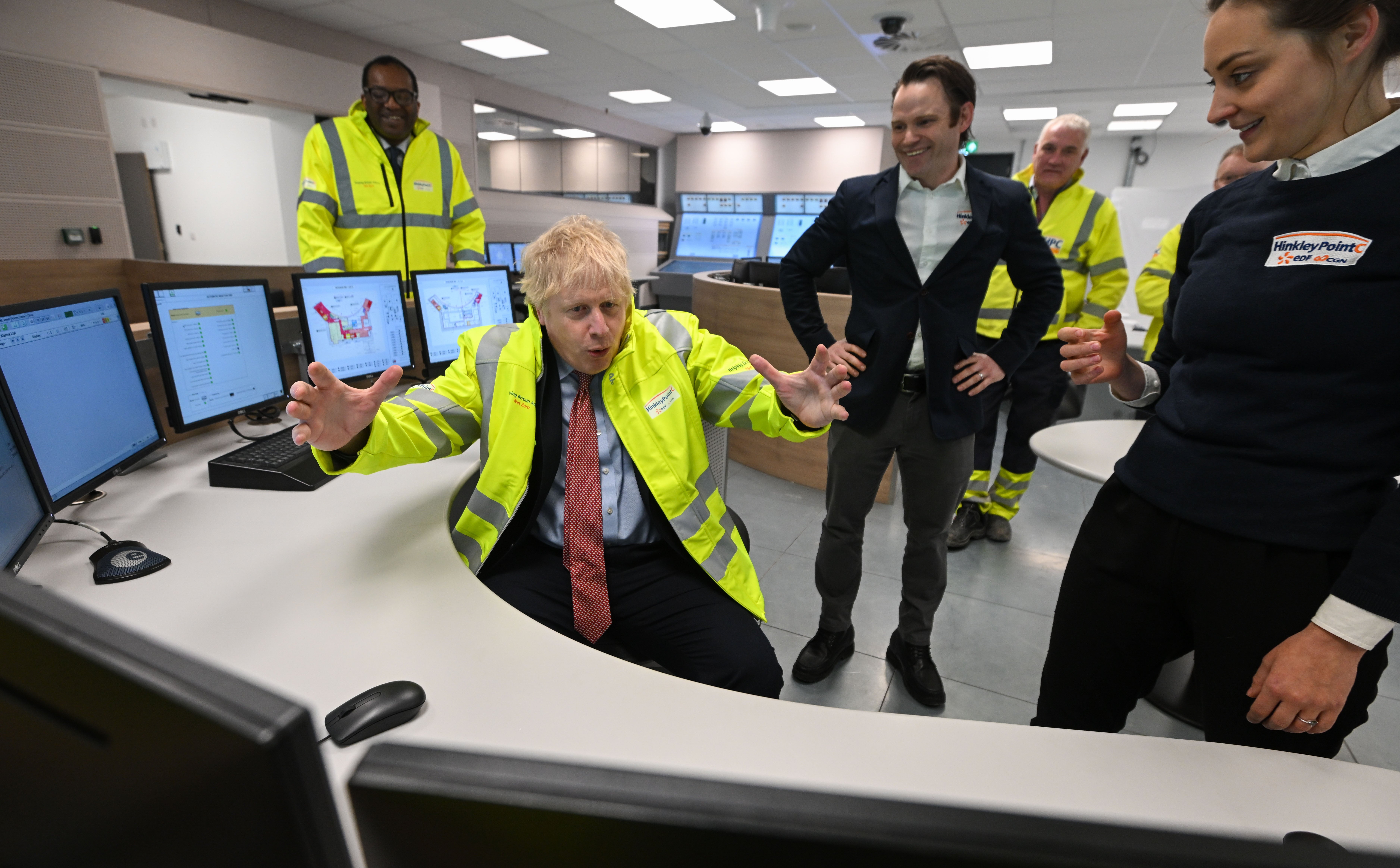This is not the ‘energy security’ that Boris Johnson promised
Letters to the editor: our readers share their views. Please send your letters to letters@independent.co.uk

Boris Johnson wants to include nuclear energy-driven power stations as part of the energy infrastructure of the UK in order that we will not, in future, be dependent on foreign sources of power. Apart from the intrinsic risk of a malfunction through whatever cause and the problem of disposal of nuclear waste, I’m not sure where the UK uranium mines are located. If we, as I suspect, do not have any “British” uranium ore, we will have to import it.
This immediately negates the “energy security” argument put forward by Johnson et al. The only truly national sources of energy apart from fossil fuels are wind, tidal and solar, combined with a limited amount of geothermal energy in some geographical areas. If the UK really wants energy security then nuclear has to be discarded in favour of these non-polluting and limitless energy sources.
Patrick Cleary
Gloucestershire
In the discussion about the government’s new energy strategy, I have heard no reference to the potential use of small-scale hydro generation. The UK receives substantial rainfall on high ground and this water tumbles down innumerable streams to lower ground as it makes its way to the sea. Is it beyond our engineering ingenuity to devise cost-effective small generators to exploit this free source of energy?
Such schemes would of course need connecting to the grid, adding to the initial cost, but the running costs would be minimal compared to nuclear power or offshore wind. The pioneering Lord Armstrong showed what could be done with the small hydro-scheme installed in the late 19th century at his Cragside home in Northumberland, the first house in the world to be lit by electricity.
John Wilkin
Bury St Edmunds
The law isn’t the only thing that matters
Two things apropos Ms Murty and her non-dom status. First, the optics: this simply does not look good and people will make a connection with the chancellor’s awful treatment of the poorest in his spring statement.
Secondly, while the legal position appears clear, and that no law has been broken, the law, in all matters in which it applies, really is the lowest common denominator of behaviour.
Richard Lloyd
Dunfermline
Can we stop politicians from lying?
How do you stop the prime minister and ministers from lying and making false statements? The answer may lie in research being undertaken at Tel Aviv University that is predicted to result in artificial intelligence-equipped cameras able to detect deception by measuring people’s subtle facial movements.
But, once developed, would parliament agree to their installation? Perhaps we should ask the prime minister for an honest opinion!
Roger Hinds
Surrey
Priti Patel and Ukrainian refugees
Only a quarter of the 12,000 Ukrainian refugees granted UK visas have actually made it here. Asked to explain why, home secretary Priti Patel replied: "I’ll be very candid, it has taken time. Any new scheme takes time, any new visa system takes time".
Britain has accepted far fewer Ukrainian refugees than other countries, with Germany opening its doors to 300,000 Ukrainians and Ireland welcoming 20,000. According to Patel, this is because “Germany is an EU country”.
This explains nothing. Faced with the refugee crisis, most European countries – Germany and Poland among them – have put humanitarian considerations over bureaucracy and have waived visa requirements. It seems to me, under Priti Patel, the UK Home Office has been weaponised against refugees.
Patel has built her career on creating a hostile environment for refugees, asylum seekers and immigrants who she views as criminals. I believe Patel’s Home Office is an anti-refugee machine and it doesn’t have a reverse gear.
The UK is treating Ukrainian refugees with the same inhumanity it has treated refugees from Afghanistan, Syria and Libya.
Sasha Simic
London
To keep up to speed with all the latest opinions and comment, sign up to our free weekly Voices Dispatches newsletter by clicking here
Expelling Russia from the UN may be necessary
Expelling Russia from the Human Rights Council of the United Nation is entirely appropriate given the scale of human rights transgressions committed upon the people of Ukraine.
A far bolder, if more difficult, task would be to eject Russia outright from the UN. A precedent was Russia’s (then the Soviet Union) ejection from the League of Nations in 1939 for the illegal invasion of Finland. To be the only country to be thrown out of both world peace-keeping organisations would be a national humiliation, however Putin tries to present it.
Of course, enforcing expulsion requires overcoming Russia’s veto in the Security Council, a challenge made more difficult by the non-committal position of China. Technically, Russia’s legal place on the Security Council has always been dubious given it simply succeeded in the place of the USSR after its collapse.
And if Russia’s removal cannot be achieved then making both the Security Council and General Assembly more an international courtroom (as to some degree it became during the Cuban missile crisis) to daily hold Putin to account with graphic testimony and imagery of his brutal campaign of terror, for the world and those still uncommitted nations to hear and see, may be the next best thing.
Paul Dolan
Cheshire
Join our commenting forum
Join thought-provoking conversations, follow other Independent readers and see their replies
Comments
Bookmark popover
Removed from bookmarks